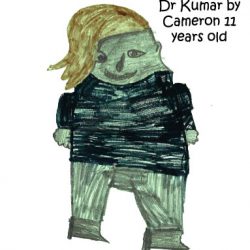What do I do if I think my child has Neurodevelopmental difficulties?

You can start by speaking with your GP or school, if they believe it’s appropriate they can send us a referral. If you speak to your GP rather than school, we will need to speak to school at some point so it would be useful if you could liaise with them about the referral. It would be really helpful if the referrer provides us with as much information as possible.
Are there two pathways within Rotherham CAMHS that provide Autism and ADHD Assessments?
Rotherham CAMHS is split into several different pathways that all have slightly different purposes and roles. There are 2 pathways within Rotherham CAMHS that conduct Autism and ADHD assessments. The pathway that your child has their assessment through depends on their overall cognitive ability and level of functioning. The majority of children and young people will have their assessments through the Neurodevelopmental Assessment pathway, but a smaller number will have their assessments through the Intellectual Disability (ID) CAMHS pathway. Both pathways have very similar assessment processes, but these are tailored to the needs of the families they see.
The Neurodevelopmental Assessment pathway is a pathway for children and young people who have no cognitive difficulties, who may have learning difficulties that are specific and mild, and who may have more global cognitive and functioning difficulties such as an Intellectual Disability (sometimes called a Learning Disability) that is in the Mild range.
My child has a moderate to severe intellectual disability, will your pathway assess my child for a neurodevelopmental disorder?
No the ID CAMHS pathway is a pathway for children and young people with Moderate to Profound Intellectual Disabilities (sometimes called a Learning Disability). It is like a ‘mini CAMHS’ all in one pathway as it provides everything that the rest of the CAMHS pathways provide, including Autism and ADHD assessments, but only for children and young people with Moderate to Profound Intellectual Disabilities. This service exists because children and young people with such a severe form of overall impairment require a more specialist level of expertise to assess and help them and their families when they have difficulties with their emotional wellbeing or mental health. The Rotherham Intellectual Disability CAMHS webpage has more information about this service.
How do I make sure my child is assessed most appropriate pathway?
It is not always easy to make sure children are directed to the most appropriate pathway for their Autism or ADHD assessment when they are first referred as sometimes referrals are not sent with all the relevant information, or sometimes a young person’s learning needs may not have been fully identified. For this reason it is very important that referrals contain as much relevant information as possible and that all relevant reports are sent to us when the child is first referred or as soon as possible afterwards (such as EHCP assessment and Educational Psychology reports). This helps us to direct the referral to the most appropriate pathway when it is first sent into CAMHS as well as helps us to determine the best next steps after we have received the referral.
If a child’s referral is directed to one of these pathways, but we later feel we need more information to help us make a decision about which pathway is best, we may ask you, school or other professionals for more information or to attend additional appointments. Sometimes we will conduct the assessments we need to do to explore your child’s overall learning ability as part of their Autism or ADHD assessment. If a child’s Autism or ADHD assessment is started within one pathway and it is then decided they would have been more appropriate for the other pathway, this does not matter and we will still finish the assessment as we would have done if this was not the case. There are members of staff who work in both pathways and so, if this happens, your child will still have a thorough and robust assessment with an appropriately qualified clinician.
How long is the waiting list?
Due to the current high demand for Neurodevelopmental assessments, there are currently long waiting times for these assessments and the team is not able to offer an estimate of when your child might be seen. The team understand that waiting for these assessments can be difficult, frustrating and an uncertain time for families. However it is important to recognise that a diagnosis will not provide a “quick fix” for a child’s difficulties; it simply may help parents/carers to understand their difficulties better. No matter what stage a family is at, there are services that can offer support regardless of whether a child has a diagnosis or not.
Can a child be expedited on the waiting list?
NHS Rotherham CCG, RDaSH and RMBC are working in partnership to tackle the long wait for ASD/ADHD assessments. As part of this we are developing various ways of managing on-going demand and addressing the waiting list, including offering assessments via Healios for young people for whom this is a suitable option. The previous system of expediting meant that those remaining on the waiting list had to wait even longer and so in June 2019 the decision was made to cease the expediting process. Our website contains information around how to access support locally whilst waiting for an assessment – more information
What can I do to help my child?
You don’t need a diagnosis to start putting strategies in place. There are local services available that you can access, for example, the Rotherham Parent Carer Forum, Early Help, SENDIASS, 0-19 Health and Wellbeing Service. You can also speak to your child’s school and discuss the strategies they are putting in place, as well as make any suggestions that you feel might work better.
My child is on the waiting list however his/her difficulties have worsened, can he/she be seen quicker?
We are sorry that your child is struggling at the moment and we wish could provide an assessment quicker. However there are currently very long waits for a Neurodevelopmental assessment due to the number of children being referred for this service. We are working very hard with our partners – NHS Rotherham CCG and RMBC to develop an action plan to tackle this long wait and as part of this we are looking at various options for managing ongoing demand and addressing the waiting list.
Other agencies that offer support for young people and families and do not require a diagnosis are: Rotherham Parent/Carer Forum, Early Help and SENDIASS
You can also check out our tips pages and links to online support.
If you think your child is experiencing additional mental health difficulties, please contact our Getting Advice Pathway.
What can my school do to help?
 Your child does not need a diagnosis in order to get support in school. Schools must comply with the Special Educational Needs and Disability (SEND) code of practice (January 2015) and follow the guidance and processes described.
Your child does not need a diagnosis in order to get support in school. Schools must comply with the Special Educational Needs and Disability (SEND) code of practice (January 2015) and follow the guidance and processes described.
If a young person has a significantly greater difficulty in learning than the majority of others of the same age, then he or she would be considered to have Special Educational Needs (SEN).
There is a full guide for parents available on line published in August 2014 by the Department for Education:
Special Educational Needs and Disability – a guide for parents and carers
Teachers and other school staff need to do all they can to give your child the support they need. This could be achieved by getting advice and support from specialists outside the school (such as an educational psychologist, a speech and language therapist or the specialist teaching and advisory service).
SEN support can take many forms, which could include:
- A bespoke learning programme for your child.
- Extra help from a teacher or a teaching assistant.
- Making or changing materials and equipment.
- Working with your child in a small group.
- Helping your child to take part in class activities and group work.
- Making sure that the young person has understood things by encouraging them to ask questions and to try something they may find difficult.
- Helping other children to work with your child or play with them at break time.
- Offering support with physical or personal care difficulties such as eating, getting around safely, using the toilet or dressing.
What should we bring to the initial appointment?
Please bring reports on your child from their school or services that may be involved locally, such as Education Health Care Plan, Speech and Language Therapy, Occupational Therapy or Educational Psychology.
We do not have a separate waiting area for our pathway. Therefore our children and families have to share the waiting rooms with other families accessing CAMHS and other NHS services/Local Authority services within the building. There are times when the waiting room can get busy. We would advise if your child is sensitive to noise or dislikes crowds that you bring appropriate ‘tools’ to help support your child, for example ear defenders or music to listen to. We also have a corridor outside the waiting room that you are welcome to wait in if it becomes too much for your child. Additionally, if you let the receptionist know, she will try to organise a quieter area for you to wait.
Who should attend?
If your child is of school age, we will usually talk to one or both parents (or another adult who knows your child well) while they are being assessed. If your child is likely to want one of you to stay with them, it is helpful if the other parent could attend to talk to us about their developmental history to date.
You may wish to invite other professionals involved in your child’s care to the feedback session when all assessments have been completed. We will ask you for details of other professionals you might want to invite when you attend the first appointment.
Who will we meet at CAMHS?
Rotherham’s Neurodevelopmental Assessment Pathway has a team of professionals with a range of skills and training with children, young people and their families. The team consists of: Clinical Psychologists, CAMHS Practitioners (the practitioners have various backgrounds, for example nursing) and Assistant Psychologists.
What happens if my child gets a diagnosis?
A diagnosis of Autism may mean a referral to the Autism Family Support Team. A diagnosis of ADHD may require a referral to our ADHD Clinic. Medication may be considered by the ADHD clinic however this is only in certain cases and if used will not remove all the symptoms.
A diagnosis of Autism can allow a referral to the Autism Information and Advice Service. They provide advice and supports sessions for families who have recently received a diagnosis of Autism, as well as training courses and workshops.
A diagnosis of ADHD may lead to a referral to our CAMHS ADHD Clinic. Medication may be considered by the ADHD clinic, however, this is only in certain cases and if it is prescribed, it will not remove all the symptoms of ADHD.
After the assessment, your child’s school may then consider applying for an Education, Health and Care Plan (EHCP) for your child, if they haven’t already. Please note, the EHCP assessment process can be started and completed without a diagnosis, whilst a child is on the waiting list or not known to CAMHS at all. Schools are able to put strategies and support in place without an assessment from CAMHS.
What happens if my child does not get a diagnosis?
 Lots of services can still provide support for you and your child in this situation. You will still receive a full report of the assessment which will highlight their strengths and difficulties and provide a number of recommendations specifically for your child. You will also have a feedback appointment in which we will discuss this decision with you.
Lots of services can still provide support for you and your child in this situation. You will still receive a full report of the assessment which will highlight their strengths and difficulties and provide a number of recommendations specifically for your child. You will also have a feedback appointment in which we will discuss this decision with you.
What do we mean by Learning Difficulties and Learning Disability/Intellectual Disability?
There are a few different terms used to talk about difficulties someone might have with their learning and overall ability. Sometimes the terms used differ between health services (like CAMHS) and schools and colleges. This is often because some terms are diagnoses given by appropriately qualified clinicians and some may be other sorts of labels that are used more by non-health professionals, but below is a list and brief explanation of some of the terms that you may hear when we are talking with you about your child or that might appear in our reports.
 Intellectual Disability – An Intellectual Disability (also sometimes called a Learning Disability) is a global deficit in cognitive functioning and adaptive behaviour. This is a diagnosis that may be considered as part of your child’s assessment for Autism or ADHD. This means that someone has significant difficulties in lots of different areas of cognitive ability, such as their understanding of and ability to use words, memory, problem solving skills and how fast they can think about things. They will also have significant difficulties with adaptive behaviour, which is difficulties with real-life skills such as grooming, getting dressed, avoiding danger, safe food handling, understanding and following rules, managing money, cleaning, and making friends. There are different severities of Intellectual Disability diagnosis, which are usually called Mild, Moderate, Severe and Profound. Deciding which of these words is the best way to describe what sort of Intellectual Disability a young person has is a complicated clinical decision, but all of them, even Mild Intellectual Disabilities, mean that someone’s overall level of functioning is very low and different from most other people their age. An Intellectual Disability is something someone is born with and, while their strengths and needs may change as they get older, there is no treatment for this; although, there are strategies that may be helpful. Please see our list of other agencies that can provide support for more information on Intellectual Disabilities and strategies. The Rotherham Intellectual Disability CAMHS webpage may also be helpful.
Intellectual Disability – An Intellectual Disability (also sometimes called a Learning Disability) is a global deficit in cognitive functioning and adaptive behaviour. This is a diagnosis that may be considered as part of your child’s assessment for Autism or ADHD. This means that someone has significant difficulties in lots of different areas of cognitive ability, such as their understanding of and ability to use words, memory, problem solving skills and how fast they can think about things. They will also have significant difficulties with adaptive behaviour, which is difficulties with real-life skills such as grooming, getting dressed, avoiding danger, safe food handling, understanding and following rules, managing money, cleaning, and making friends. There are different severities of Intellectual Disability diagnosis, which are usually called Mild, Moderate, Severe and Profound. Deciding which of these words is the best way to describe what sort of Intellectual Disability a young person has is a complicated clinical decision, but all of them, even Mild Intellectual Disabilities, mean that someone’s overall level of functioning is very low and different from most other people their age. An Intellectual Disability is something someone is born with and, while their strengths and needs may change as they get older, there is no treatment for this; although, there are strategies that may be helpful. Please see our list of other agencies that can provide support for more information on Intellectual Disabilities and strategies. The Rotherham Intellectual Disability CAMHS webpage may also be helpful.
Global Developmental Delay – this is a diagnosis often given by Paediatricians when children are very young (usually under 5 years old) when they are delayed in several areas of development, such as walking, talking, speaking, toilet training, etc. As children get older this diagnosis is sometimes turned into an Intellectual Disability or Learning Disability diagnosis. Children who have been described as having Global Developmental Delay may also be referred to as having ‘learning difficulties’. If your child has been described in this way in the past, please let us know any time after they have been referred to us for an Autism or ADHD assessment as it may be helpful for us to better understand them.
Learning difficulties – learning difficulties are different from an Intellectual Disability as they are significant difficulties in cognitive functioning in specific areas. Common learning difficulties are things like Dyslexia and Dyspraxia, but this can also include specific learning difficulties in verbal comprehension (understanding and using words) and specific difficulties in other areas. It is also possible for someone to have several different learning difficulties. It is common for education professionals, such as class teachers, SENCOs and Educational Psychologists to use the term learning difficulties in a general way to describe young people who have learning difficulties in more specific areas as well as young people who may have more global difficulties, such as Global Developmental Delay or Intellectual Disabilities. If you are concerned that your child has been identified as having learning difficulties or that they may have learning difficulties, especially if these have been described as moderate or severe learning difficulties, then please let us know as we may need to investigate this further as part of their Autism or ADHD assessment. Sometimes this may mean that your child will be invited to an additional appointment, we may ask for copies of reports from other agencies such as Educational Psychology, or it may mean we ask school to consider a referral to Educational Psychology for further assessment of their learning needs.
Why didn’t my child get both an ASD and ADHD diagnosis?

Children can have a diagnosis of Autism Spectrum Disorder and ADHD but it is only clinically appropriate to give both diagnoses in some cases, and an additional diagnosis should not be given if the person’s presentation is already well explained by another one of their diagnoses. It is common for children with Autism to also have difficulties with attention; however, difficulties with attention do not always meet criteria for a diagnosis of ADHD. It is also common for children with ADHD to have difficulties with social communication; however difficulties with social communication do not always meet criteria for a diagnosis of Autism.
Why is Pathological Demand Avoidance (PDA) not diagnosed?
In taking decisions about what specific services to commission, Clinical Commissioning Group’s, in liaison with Clinical Providers, make reference to documents called ‘The Diagnostic and Statistical Manual of Mental Disorders – fifth edition’ or DSM 5, and the International Classification of Diseases – 11th edition or ICD-11. These describe conditions which are recognised by clinicians and supported by evidence.
In respect of Pathological Demand Avoidance (PDA), this is not included in DSM or ICD classification systems and, therefore, the CCG’s in North Lincolnshire and Rotherham does not recognise this as a specific condition and does not provide funding for assessment of PDA in its own right. Indeed, the Elizabeth Newsome Centre, where the concept of PDA originated, do not diagnose PDA in its own right either.
However, the previous version of the DSM (the fourth edition) included; Pervasive Developmental Disorder Not Otherwise Specified (PDD-NOS), Autism, and Asperger’s Syndrome. In DSM 5, these have now been included under the general area of Autism Spectrum Disorder (ASD). PDA is viewed, as being under that broad area of ASD.
In line with The National Autistic Society, we view PDA as ‘a behaviour profile within the autism spectrum’. PDA is increasingly, but not universally accepted as a behaviour profile that is seen in some individuals on the autism spectrum. People with a demand avoidant profile share difficulties with others on the autism spectrum in social communication, social interaction and restricted and repetitive patterns of behaviours, activities or interests. However, those who present with this particular profile are driven to avoid everyday demands and expectations to an extreme extent. This demand avoidant behaviour is rooted in an anxiety-based need to be in control. While the demand avoidant profile has been found to be relatively uncommon, it’s important to recognise and understand the distinct behaviour profile as it has implications for the way a person is best supported.
It is clearly important that the CCG’s commission services that will adequately support Children and Young People. The CCG’s that commission the local CAMHS services have worked with the local CAMHS providers within Rotherham Doncaster & South Humber NHS Trust (RDaSH) to ensure that staff have an understanding of all areas of Autism. RDaSH undertakes assessments for ASD; within ASD assessments we would investigate a demand avoidance profile if clinically appropriate or clinically indicated. RDaSH will not accept referrals for specific PDA assessments if Autism assessments have already been undertaken and a PDA profile has not been indicated. If we believe a young person’s profile is consistent with PDA we will describe this within their Autism Spectrum Diagnosis. PDA is not given as a separate diagnosis
Requests for support from the ADHD Post-Diagnosis Pathway
Whenever we receive a referral where a child has been given a diagnosis of ADHD outside of Rotherham CAMHS and there is a request for medication, we ask for evidence of the assessment. This is so that our own Rotherham CAMHS Neurodevelopmental Pathway can check that the assessment process has mirrored our own and has been suitably robust prior to a prescribing clinician considering medication.
We would expect several key assessment components to be completed as part of a robust ADHD assessment as follows:
- An ADHD-specific detailed developmental history.
- A school observation of (child’s name) or information gathered from (child’s name)’s school staff that looked for difficulties related to ADHD.
- A clinic based assessment or observation of (child’s name) that assessed for difficulties related to ADHD.
- Consideration of the differential diagnosis.
If these assessment components took place, but the evidence was not included in the materials that have already been sent to us, please send them to us as soon as possible and we will review the case again. If the previous assessments lack key components, we will discuss with the referrer, young person and family what the next steps may be, for example a reassessment by Rotherham CAMHS or medicine review with a prescribing clinician.




